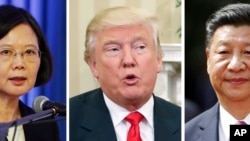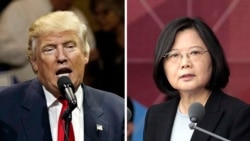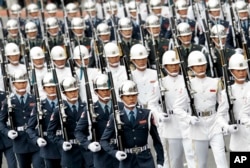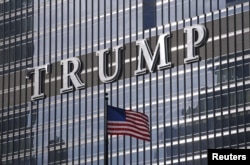China has expressed “serious concerns” about President-elect Donald Trump’s decision to call into question the United States’ continued adherence to the “one China” policy. Since 1979, no United States president or president-elect has spoken directly with Taiwan. It’s a policy based on a series of communiqués between Washington and Beijing and grounded in the Taiwan Relations Act.
White House spokesperson Josh Earnest called the practice an important diplomatic tool saying, “commitment to this policy has advanced the ability the United States to make progress in our relationship with China.”
After the president-elect took a call from Tsai Ing-wen, the president of Taiwan, and said he didn’t know if the U.S. should be bound by the “One China” policy, Earnest explained why Beijing was so quick to respond to Trump’s comments.
"The Chinese government at Beijing places an enormous priority on this situation,” said Earnest, “and it's a sensitive matter and some of the progress that we have made in our relationship with China could be undermined by this issue flaring up. It's also unclear how the people who live in Taiwan benefit from this issue flaring up the response from the Chinese government in the aftermath of this call has primarily been to ratchet up the rhetoric against Taiwan."
The United States has routinely provided weapons and other military equipment to Taiwan, and a recently passed bill has provisions for yearly military exchanges with Taipei. The EastWest Institute’s Jonathan Miller explains why there are concerns about Trump’s approach to nearly four decades of U.S. foreign policy.
“More concerning to me than the phone call itself were the comments he made since that point,” said Miller, pointing to the president-elect’s “Twitterstorm where he berated China for its activities in the South China Sea.”
Miller points up that the “most divergent change is his comment in a recent interview with Fox News seemingly bartering one-China policy, dangling that as something that could be bartered for economic concessions.”
Possible motives
The Center for the National Interest’s Harry Kazianis analyzes Trump’s motivation.
“I think it’s a one word answer: leverage. If you look at the people who are advising Donald Trump right now…these are all people [who] are [aligned] in one fact: that the United States needs to push back on China. And they’ve all called for in one way or another to have a much more robust relationship with Taiwan,” said Kazianis.
Kazianis notes that the longstanding policy of “agreeing to disagree” on Taiwan formed the bedrock of the relationship between Washington and Beijing.
Miller says he isn’t necessarily ready to take Trump literally.
“He sees himself [as a businessman],” said Miller, “He talks about doing deals. He likes to push buttons as well.”
Chinese actions
What can Beijing do to counter Trump’s statement? Kazianis tells VOA that China was largely caught unprepared for the remarks, but currently feels the best response to the president-elect is through editorials and interviews. “Their response will be very different when he takes the Oval Office on January 20th," he said.
Kazianis lists several possible actions for China to take, “it just depends on how far they’re willing to go.” China could implement a sea blockade, cutting off Taiwan’s trade partners and weakening it economically. Beijing also could move in other military assets like aircraft carriers and fly fighters in the region.
“Keep in mind, one of the reasons the Chinese military has been rebuilt in the last 20 to 25 years is if Taiwan ever tried to declare independence to take back that so-called renegade province,” said Kazianis.
These are merely possibilities that hinge on the implementation of Trump’s foreign policy and not the actions of, as Kazianis notes, a private citizen poised to take the highest office in the United States.
















